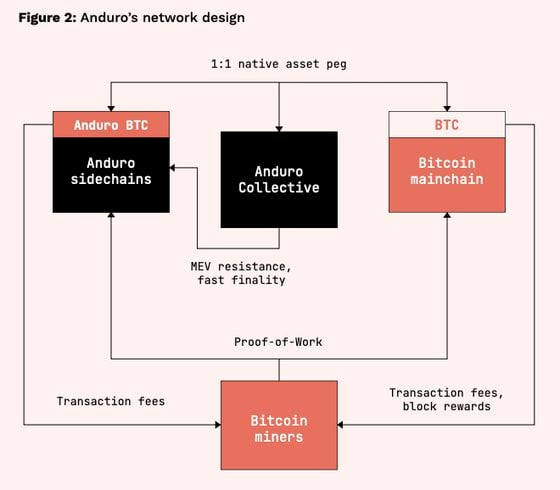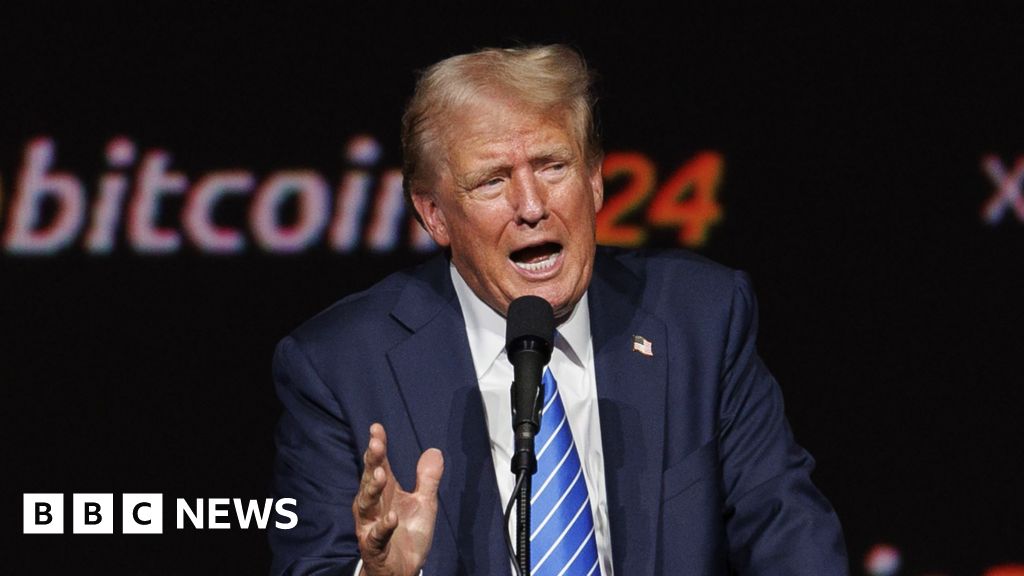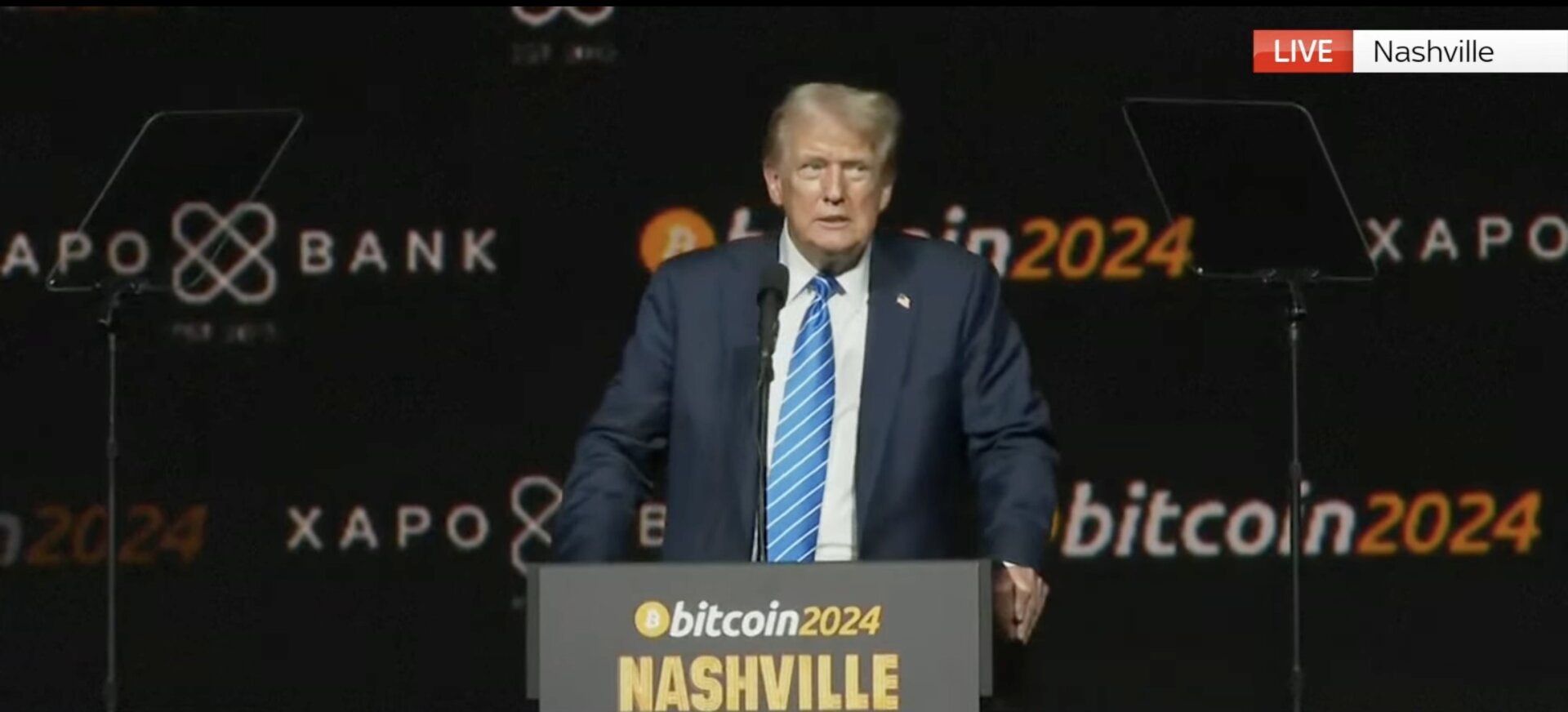Tech
The Latest Tech News in Crypto and Blockchain

March 6: Prediction market PredX, an AI-enabled event exchange, launched its testnet on the Sei blockchain, allowing members of the PredX community the ability to exchange their opinions on current trends and events and buy shares based on the likelihood of specific outcomes, according to the team: “PredX uses an original AI algorithm to customize event suggestions according to users’ preferences in order to boost engagement while equipping users with the insights needed for making more informed decisions. PredX recently achieved a $40 million valuation following a successful pre-seed round in February led by Penrose Tech.”
Toucan, Bridging Protocol for Tokenizing Carbon Credits, Launches Biochar Market on Celo
March 6: Toucan, a bridging protocol that tokenizes carbon credits has launched the first-ever liquid market for biochar credits on the Celo blockchain, according to the team: “Toucan’s infrastructure for the automated, on-demand buying and selling of biochar carbon credits (readily available and highly permanent carbon removal) is built in partnership with Puro.earth, American BioCarbon, Celo, and more. CHAR is based on open infrastructure and aggregates verified CO2 Removal Certificates issued by Puro.earth (“CORCs”) on a single platform, bringing speed and scale to carbon markets.”
Synnax, Protocol for AI-Driven Credit Ratings, Raises $1M
March 6: Synnax, a protocol that generates AI-driven credit intelligence and ratings for the digital asset industry, announced a $1 million pre-seed funding round, led by No Limit Holdings. According to the team: “By leveraging advanced encryption, blockchain and decentralized AI, Synnax’s technology-driven concept includes secure data exchange protocols to maintain data privacy, while a unique decentralized consensus mechanism generates unbiased and predictive credit ratings and intelligence for issuers of on-chain debt and tokenized assets.”
Web3 App Store Magic Square Unveils $66M Grant Program
March 6: Web3 app store Magic Square is dedicating $66 million worth of its native SQR token for grants to projects listed on its platform. The Ecosystem Grant Program consists of 120 million SQR, equivalent to 12% of the token’s total supply, according to an emailed announcement shared with CoinDesk on Wednesday.
Protocol Village is a regular feature of The Protocol, our weekly newsletter exploring the tech behind crypto, one block at a time. Sign up here to get it in your inbox every Wednesday. Project teams can submit updates here. For previous versions of Protocol Village, please go here. Also please check out our weekly The Protocol podcast.
Stacks Says Blockdaemon, NEAR, 6 Other Industry Players Join as Signers
March 5: Stacks, a Bitcoin layer-2 network, has integrated eight new industry players into its network. According to the Stacks Foundation team: “Blockdaemon, NEAR Foundation, DeSpread and others will join as new Signers of Stacks’ open and decentralized network, allowing them to participate with its wider ecosystem of validators in signing new blocks. This commitment reflects their dedication to fostering innovation within the Bitcoin ecosystem, paving the way for more developments and applications.”
Crypto AI Startup Sahara Raises $6M to Reward AI Trainers
March 5: Sahara, the latest startup to blend the worlds of crypto and artificial intelligence, says it can help workers and companies get compensated for their knowledge, expertise and data in the age of AI. The Los Angeles-based startup has raised $6 million in a seed funding round led by Polychain Capital. The round also included participation from Samsung Next, Matrix Partners, Motherson Group and Sandeep Nailwal, co-founder of the Polygon blockchain ecosystem. The project was co-founded by Sean Ren, an AI researcher and tenured member of the school’s computer science faculty at the University of Southern California (USC).
Polygon Lands Astar Network as First User of New ‘AggLayer’
March 5: Astar, a blockchain network prominent in the Japanese Web3 community, said that its Astar zkEVM will be the first network to fully integrate into Polygon’s new AggLayer, a solution that connects blockchains with zero-knowledge proofs to other networks in Polygon’s ecosystem, to provide unified liquidity. Astar zkEVM is powered by Polygon’s Chain Development Kit (CDK), a customizable framework that lets users build their own zero-knowledge blockchains using Polygon’s technology.
Symbiosis, Cross-Chain DEX, Integrates With Bitcoin Layer-2 Rootstock
March 5: Symbiosis, a cross-chain AMM DEX compatible with Ethereum’s EVM runtime as well as WASM (NEAR), has integrated with Rootstock, a Bitcoin layer-2 network, marking “a significant leap in blockchain interoperability, especially enhancing Bitcoin’s connectivity with the crypto ecosystem,” according to the team: “This strategic alliance revolutionizes cross-chain swaps, ensuring seamless, secure transactions across top blockchains like Ethereum, Avalanche, BNB and more.”
Fetch.ai Unveils ‘Fetch Compute,’ a $100M Project for AI Development
March 5: Fetch.ai unveiled its new Fetch Compute, a $100 million project fueling AI development with Nvidia graphics processing units (GPUs), according to the team: “This major infrastructure investment secures the expansion of the tools and training capabilities available to its users and developers. Backed by the Fetch Ecosystem Fund, this initiative aims to address GPU scarcity, empowering developers worldwide to create advanced applications and drive innovation within the AI economy.”
Utila, Enterprise-Grade MPC Wallet, Gets $11.5M in Seed Funding
March 5: Utila, an enterprise-grade crypto operations platform and MPC wallet provider, announced $11.5M in seed funding from NFX, Wing VC Framework Ventures and other leading Web3 and fintech VC funds and prolific angel investors including Balaji Srinivasan, Charlie Songhurst and Surojit Chatterjee.
Fireblocks Appoints Snyk’s Michal Ferguson as Chief Marketing Officer
March 5: Fireblocks, a crypto custody technology firm, announced the appointment of Michal Ferguson as chief marketing officer (CMO), “a strategic move to capitalize on growing market opportunities and address demand for secure, scalable blockchain solutions,” according to the team: “Having spent a decade in tech, Ferguson joins the team from Snyk where she focused on building and scaling go-to-market functions. In her new role at Fireblocks, Ferguson will focus her immediate efforts on amplifying the organization’s pipeline of product launches geared toward institutional trading and mass adoption within the financial sector.”
Crypto Payments Specialist Baanx Raises $20M Funding Round
March 5: Baanx, a cryptocurrency payments specialist authorized by the U.K.’s Financial Conduct Authority (FCA), has raised a $20 million Series A funding round, the company said on Tuesday. The investment round, which included Ledger, Tezos Foundation, Chiron and British Business Bank, brings the crypto payment enabler’s total funding to over $30 million.
Io.net, Decentralized Network for GPU Compute, Raises $30M
March 5: Io.net, a decentralized network for GPU compute, announced a $30M funding round led by Hack VC. Among other participants: Multicoin Capital, Delphi Digital, Solana Labs, Aptos Labs, OKX and more.”
Stacks Developer Trust Machines Launches ‘Orange Domains’ With Tucows, Hiro
March 4: Trust Machines, a contributor to Bitcoin projects including layer-2 Stacks, started a joint venture with the publicly traded company Tucows to introduce “Orange Domains,” according to a post on X by CEO Muneeb Ali. The new entity “will expand the functionality of the Bitcoin Name System (BNS) through decentralized apps, as well as develop new top-level domain (TLD) services to better connect the traditional Domain Names System (DNS) with Web3 digital identities,” according to a press release. “The Web3 domain will function as a digital identity and act like an NFT, providing the keys to an equivalent domain for everyday internet users. This will enable anyone to build a website, send an email, secure finances, art, contracts and more, from one single-domain solution on the blockchain.” Bitcoin developer tooling company Hiro Systems “will provide domain expertise on building Bitcoin smart contracts, digital assets, and decentralized applications.”
Stack Raises $3M from VCs Including Archetype, Coinbase Ventures
March 4: Stack, a platform for creating and managing point systems, has raised $3M from Archetype, Coinbase Ventures and other VCs and angels to bring points, loyalty programs and identity primitives on-chain, according to the team: “Stack’s Typescript SDK enables teams to implement these point and loyalty systems seamlessly into their products with features like event-based point assignments, cross-chain token redemptions, leaderboards, analytics and GraphQL APIs.”
ZkLink Launches ‘First Aggregated Layer-3 zkEVM’
March 4: ZkLink, a zero-knowledge layer-3 infrastructure provider, announced the launch of zkLink Nova, claiming it’s “the industry’s first aggregated layer-3 zkEVM rollup network,” based on zkSync’s ZK Stack and zkLink Nexus, according to the team: “Vince Yang, CEO of zkLink, commented on the news, ‘For too long, the lack of interoperability between chains has stunted innovation and adoption. With Nova, we are pioneering the concept of an Aggregated Layer 3 that unifies liquidity and development across Ethereum and layer-2 blockchains.'”
Boson Developing Second Protocol ‘Fermion’ for On-Chain Exchange of Watches, Vintage Wine
March 4: Boson Protocol, a decentralized actuator oracle founded by Justin Banon to tokenize commerce products from point of sale to redemption, is developing a second protocol, Fermion, to enable on-chain exchange of high-value physical real-world assets (RWAs) such as watches, vintage wine and fine art, according to a press release. “Fermion is designed to meet the high verification requirements of physical RWAs with a fundamentally different protocol design that incorporates trusted verifiers and custodians.” The core Boson protocol runs on EVM-compatible blockchains such as Ethereum, Polygon or Gnosis, uses indexing from The Graph and relies on data “stored in an immutable decentralized file system such as IPFS,” according to the project documentation.
Ankr to Create Liquid Staking Tokens for Bitcoin Staked via Babylon
March 2: Babylon, builder of protocols for Bitcoin blockchain timestamping and bitcoin staking, announced a collaboration with Ankr, a Web3 infrastructure company, to bring security and liquidity to proof-of-stake (PoS chains), according to the team: “Ankr will create liquid staking tokens (LSTs) for the bitcoin staked via Babylon. The LSTs will then be issued on PoS chains secured by the BTC staking protocol. For stakers, this means their BTC will be locked on the bitcoin blockchain while new LSTs are minted on the PoS chain they chose to provide security for. Ankr will also run validators on Babylon’s testnet and build advanced security infrastructure to support Babylon’s nodes and finality providers.” CoinDesk 20 asset: (BTC)
Worldcoin Developer Tools for Humanity Acquires Crypto Wallet Ottr
March 2: Ottr, a crypto wallet powered by Solana, announced its team is joining Tools For Humanity (TFH), a primary contributor to the Worldcoin project, to lead development of TFH’s user-friendly mobile wallet, World App, used by over 3 million people monthly, according to the team: “Since launching Ottr Wallet 18 months ago, the Ottr team developed a self-custody wallet with seamless integration with U.S. bank accounts, gas-free transfers and trading, passwordless cloud backups and a comprehensive dApp store. Now, they’ll bring their expertise to TFH to help provide more people with access to the digital economy.”
Wormhole Reveals ‘Native Token Transfers’ to Be ‘Simpler’ Than Wrapped Assets
March 2: Wormhole, a protocol for communication between blockchains, just revealed “Wormhole Native Token Transfers,” a new framework for making any token multichain, securely and efficiently, according to the team: “NTT introduces an open, flexible, and composable framework for transferring native tokens across blockchains while preserving their intrinsic properties. Compared to wrapped assets, NTT is simpler, decentralized, marking a significant stride forward for interoperability. Projects built on NTT retain control over their tokens’ behavior on each chain, including customizability, metadata and ownership/upgradeability.” According to a blog post, NTT is “powering natively multichain tokens for industry-leading projects like Lido, ether.fi, Puffer Finance, PIKE and Wormhole.”
Bitcoin Layer-2 Project BOB Announces ‘ETH-Settled Rollup,’ Plans Launch Around Halving
March 2: BOB, a Bitcoin layer-2 blockchain project, announced its innovative hybrid solution between Bitcoin and Ethereum at their “Bitcoin Renaissance” event, a side event of ETHDenver attended by 1,500 individuals, according to the team: “This solution introduces an ETH-settled rollup that leverages an advanced merged mining technique to inherit Bitcoin’s PoW security. Looking ahead, BOB plans to enable settlements on both Bitcoin, via BitVM, and Ethereum. The project also revealed that its mainnet launch is timed to coincide with the upcoming Bitcoin halving.” CoinDesk 20 asset: (BTC)
Taiko, an ‘Ethereum-Equivalent ZK Rollup,’ Raises $15M
March 2: Taiko, a layer-2 scaling solution provider for the Ethereum blockchain, has raised $15 million in a series A funding round, adding to the growing amount of investment allocations to crypto projects from venture-capital firms. The fundraise was led by Lightspeed Faction, Hashed, Generative Ventures and Token Bay Capital, according to a press release. Other investors in the round included Wintermute Ventures, Presto Labs, Flow Traders, Amber Group, OKX Ventures, GSR and WW Ventures. The latest round brings Taiko’s total fundraising across three rounds to $37 million.
Clone Markets, Clone Liquidity Mainnet Launched March 1
March 2: Clone, an open-source protocol for trading non-native tokens on the Solana blockchain, has announced the public mainnet launch of Clone Markets and Clone Liquidity launched on March 1, according to the team: “The launch will introduce highly liquid markets for non-native assets via Clone’s innovative “cloned assets” (clAssets), creating a more seamless, efficient and accessible trading environment for Solana users. Arbitrum, Optimism and Sui’s network tokens will be available to trade with deep liquidity on Solana for the first time.”
Renzo, Liquid Restaking Protocol, Expands to Arbitrum in Deal With Connext
March 1 (PROTOCOL VILLAGE EXCLUSIVE): Renzo, a liquid restaking protocol, has partnered with Connext to bring cross-chain restaking for Arbitrum, according to the team: “This now enables cross-chain restaking for multiple L2 networks, including BNB Chain, Linea, Base and now the Arbitrum network. Due to the lower fees rollups provide, users on L2s that have partnered with Renzo now provide restaking at a fraction of the cost while also allowing users to restake ETH on their supported network of choice. Renzo and Connext achieve this with ezETH, with EigenLayer leveraging Connext’s bridging and message-passing protocol to transfer ERC-20 with no slippage.”
Layer-2 Network Metis Integrates Chainlink CCIP as Canonical Token Bridge
Feb. 29: Metis, an Ethereum layer-2 network, plans to integrate Chainlink’s interoperability solution, Chainlink CCIP, “as its canonical token bridge infrastructure, enabling the Metis ecosystem to expand its cross-chain footprint, enhance user and developer experience and accelerate adoption,” according to the team. “As a part of this integration, the Metis bridge interface will be upgraded to leverage Chainlink CCIP as the official cross-chain infrastructure to power the canonical Metis token bridge, with an initial focus on bridging leading stablecoins from Ethereum mainnet onto the Metis network.” CoinDesk 20 asset: {{LINK}}
Alchemy Launches ‘Embedded Accounts’ to Onboard Users to Web3
Feb. 29 (PROTOCOL VILLAGE EXCLUSIVE): Alchemy is launching Embedded Accounts, “the easiest way to onboard users to Web3, according to the team. “It’s a simple all-in-one solution to:
1. Onboard users with Web2 login (email, passkeys, and soon social auth)
2. Transact with zero friction. One-click checkout by sponsoring gas and batching tx
3. Build custom smart accounts with account recovery, multisig, session keys and more
Our mission at Alchemy is to onboard the whole world to self-sovereign Web3 accounts. To achieve this mission, wallets must become invisible by abstracting away the tech such that the user doesn’t even know they’re using a wallet.”
Max Howell’s Tea Protocol Aims to Address Challenges in OSS Development
Feb. 29: Tea Protocol, founded by Max Howell, the creator of Homebrew’s open-source software package management, said that his “latest project leverages blockchain technology to address longstanding challenges in OSS development, marking a significant step towards a more sustainable and equitable ecosystem for software creators.” According to the team, Tea is “at the forefront of supporting OSS development through Web3 technology. This innovative approach ensures transparent and fair compensation for developers, enhancing collaboration and innovation within the open-source community.”
QuickNode Launches Real-Time Blockchain Data Solution ‘Streams’
Feb. 29: QuickNode, a Web3 development platform, is launching “Streams,” a real-time blockchain data streaming solution, aiming to revolutionize blockchain infrastructure by providing instant access to historical and real-time data from Ethereum, Polygon and Binance Smart Chain, according to the team: “Streams empowers developers with popular programming languages, bridging the gap between blockchain data and conventional tools, reducing operational costs and expediting time-to-market for decentralized applications (dApps).”
Crypto Losses From Hacks, Rug Pulls Up 15% YTD, Immunefi Says
Feb. 29: Immunefi, a bug bounty and security services platform for Web3 protecting over $60 billion in assets, released its “Crypto Losses in February 2024” report, showing a loss of $200.5 million to hacks and rug pulls in 2024 year-to-date, a 15.4% increase when compared with the same period in 2023. For the month of February alone, some $67.1 million was lost due to hacks and rug pulls, with the most targeted chain being Ethereum. Hacks continued to be the predominant cause of losses, accounting for $65.4 million, compared to fraud.
Bitcoin Miner Marathon, Plans ‘Anduro,’ a Multi-Chain Layer-2
Feb. 29: Marathon Digital Holdings, a publicly-traded bitcoin mining firm, disclosed it has been incubating Anduro, a new programmable, multi-chain layer-2 network atop the Bitcoin blockchain. It’s a “platform built on the Bitcoin network that allows for the creation of multiple sidechains,” according to a press release. “Marathon is already developing the first two sidechains on Anduro, Coordinate and Alys, which can be further developed by open-source contributors. These chains demonstrate Anduro’s flexible programmability. Coordinate offers a cost-effective UTXO stack for the Ordinals community, whereas Alys is an Ethereum-compatible chain for institutional asset tokenization. Anduro’s sidechains utilize a process called merge-mining. Participating miners, like Marathon, may be able to earn Bitcoin-denominated revenue from transactions that occur on Anduro’s sidechains while continuing to mine bitcoin on the base-layer uninterruptedly.”
 Schematic of Marathon’s “Anduro” network design, from the litepaper. (Anduro)
Schematic of Marathon’s “Anduro” network design, from the litepaper. (Anduro)
ZkHub, Powered ZkLink, Claims Ethereum’s First Multi-Rollup DEX to Offer Central Limit Order Book
Feb. 29: The team from ZkLink, a multi-chain ZK rollup and layer-3 protocol, announces that zkHub has built a multi-rollup orderbook decentralized exchange (DEX) based on ZK technology, to address difficulties when navigating between layer-2 rollups, such as high transaction costs, security issues and operational complexity. “ZkHub is Ethereum’s first multi-rollup DEX to offer users a high-performance Central Limit Order Book (CLOB) with multi-chain native asset support, low transaction fees and Ethereum grade security,” according to a blog post.
Coinbase Adds ‘Smart Wallet’ Feature, So Lengthy Seed Phrases Aren’t Needed
Feb. 29: Coinbase, the publicly traded U.S. cryptocurrency exchange, is coming out with two new wallet solutions that are supposed to make the onboarding of new users into crypto easier. The features, known as their smart wallet and embedded wallets, aim to overcome hurdles that often come with the clunky user experience when creating crypto wallets.
Shiba Inu Adopts Tech to Bring More Privacy to SHIB Token Holders
Feb. 29: Shiba Inu plans to introduce a new privacy-focused network on top of the Shibarium blockchain in a move that boosts the value proposition of SHIB tokens, a representative shared with CoinDesk in a release on Wednesday. Shiba Inu is working with open-source cryptography company Zama on the as-yet-unnamed network. The network will use Fully Homomorphic Encryption (FHE) – a privacy tool that lets developers use data on untrusted domains without needing to decrypt it. (SHIB)
Rarible, NFT Infrastructure Provider, Launches ‘Rarible API’
Feb. 29: Rarible, a provider of real-time infrastructure for NFT wallets, games and marketplaces, launched “Rarible API,” which is “designed to simplify the complex nature of building in the NFT space,” according to the team: “It offers a comprehensive set of features, meeting the ever evolving needs of the Web3 ecosystem, including a real-time NFT indexer, aggregated order book, multi-chain support and trading SDK. Built with developers and creators in mind, Rarible API provides a robust infrastructure, enabling and inspiring the invention of future NFT experiences.
Tech
The Information Hires Peterson to Cover Tech, Finance, Cryptocurrency

My life is nice
Tech news site The Information has hired Business Insider actress to cover technology, finance and cryptocurrencies.
She was part of Business Insider’s investigative team. She was also previously a corporate technology reporter and a technology deals reporter.
Peterson has been with Business Insider since June 2017 and is based in the San Francisco office.
She previously worked for Folio as an associate editor. She holds a bachelor’s degree from the University of California-Davis and a master’s degree from New York University.
Chris Roush
Chris Roush is the former dean of the School of Communications at Quinnipiac University in Hamden, Connecticut. Previously, he was the Walter E. Hussman Sr. Distinguished Professor of Business Journalism at UNC-Chapel Hill. He is a former business reporter for Bloomberg News, Businessweek, The Atlanta Journal-Constitution, The Tampa Tribune, and the Sarasota Herald-Tribune. He is the author of the leading business journalism textbook, Show Me the Money: Writing Business and Economics Stories for Mass Communication, and of Thinking Things Over, a biography of former Wall Street Journal editor Vermont Royster.
Tech
Trump Courts Crypto Industry Votes, Campaign Donations

About the article
- Author, Brandon Livesay
- Role, BBC News
-
July 27, 2024
Donald Trump said at one of the biggest cryptocurrency events of the year that if he is re-elected president, he will fire the chairman of the U.S. Securities and Exchange Commission (SEC) on his first day.
On Saturday, Trump was the keynote speaker at Bitcoin 2024, a gathering of industry heavyweights in Nashville, Tennessee.
The Republican presidential candidate used the event to woo voters and encourage the tech community to donate to his campaign.
Cryptocurrencies have emerged as a political battleground for Republicans, with Trump saying that the Democratic Party and Vice President Kamala Harris were “against cryptocurrencies.”
The crowd was at its most animated when Trump declared, “On day one, I will fire Gary Gensler,” the SEC chairman appointed by now-President Joe Biden. The crowd applauded loudly and began chanting “Trump” at this statement.
SEC files charges against ‘Cryptocurrency King’ Sam Bankman-Frittosentenced to 25 years for stealing billions of dollars from customers of his cryptocurrency exchange FTX.
Speaking for about 45 minutes, Trump outlined some of his ideas for the industry if he wins the November election. He said he would make the United States the crypto capital of the world. His support for the sector is a 180-degree reversal from his comments in 2021, when he told Fox Business he saw Bitcoin as a “scam” that influence the value of the US dollar.
Trump told the crowd at the event that he would retain 100% of the Bitcoin currently owned or acquired by the U.S. government, adding that it would be a “national stockpile of Bitcoin.”
The former president also said he would “immediately appoint a presidential advisory council on Bitcoin and cryptocurrencies.”
He talked about the power needed to mine cryptocurrencies. “It takes a lot of electricity,” he said, adding that he would build power plants “to do that” and that it would “use fossil fuels.”
In recent months, some tech leaders have seen growing support for Trump’s presidential campaign. Tesla founder Elon Musk, who is the world’s richest person, has backed Trump. And cryptocurrency moguls the Winklevoss twins, who attended his speech on Saturday, have also come out in support.
Trump noted that his campaign accepts cryptocurrency donations, saying that in the two months since allowing cryptocurrency transactions, he has received $25 million (£20 million) in donations. However, he did not say how much of the payments came from cryptocurrency.
Trump used his speech to frame cryptocurrency regulation as a partisan issue, saying the Biden administration was “anti-crypto.”
Several Republican lawmakers also attended Trump’s speech, including Senators Tim Scott and Tommy Tuberville. Former Republican presidential candidate and Trump ally Vivek Ramaswamy was also in attendance.
The event was also attended by independent presidential candidate Robert F Kennedy Jr. and Democratic Party congressmen Wiley Nickel and Ro Khanna.
Earlier, during Bitcoin 2024, Democratic Congressman Nickel said that Kamala Harris was taking a “forward-thinking approach to digital assets and blockchain technology.”
Tech
WazirX Crypto Exchange Hack and Its Bounty Program: What Does It Mean for Crypto Investors in India?

On July 18, India Cryptocurrency exchange WazirX has been hit by a cyber attack which resulted in the loss of over $230 million worth of digital assets from one of its wallets. The exchange responded by suspending regular trading and reporting the incident to Indian authorities and other cryptocurrency exchanges. The company also launched two reward programs for ethical hackers who can help the exchange trace, freeze, and recover stolen funds.
WazirX said there was a cyberattack on a multi-signature wallet operated through a digital asset custodian service known as Liminal. Multi-signature wallets have a built-in security feature that requires multiple parties to sign transactions.
“The impact of the cyberattack is over $230 million on our clients’ digital assets,” WazirX said in a blog post, adding that INR funds were not affected. The company has firmly denied that WazirX itself was hacked and has brushed aside rumors that it was tricked by a phishing attack.
The exchange also noted that it was “certain” that its hardware keys had not been compromised, adding that an external forensic team would be tasked with investigating the matter further.
But Liminal, after completing its investigation, said: “It is clear that the genesis of this hack stems from three devices compromised by WazirX.”
Meanwhile, WazirX founder and CEO Nischal Shetty said that the attack would have been possible only if there were four points of failure in the digital signature process.
Who is behind the cyber attack?
WazirX has not yet disclosed the suspected parties or perpetrators responsible for the hack. However, news reports have emerged that North Korean hackers were responsible for the incident.
On-chain analytics and other information indicate “that this attack was perpetrated by hackers affiliated with North Korea,” blockchain analytics platform Elliptic said.
In response to The Hindu’s questions to WazirX about the North Korean hackers, cryptocurrency exchange WazirX directed us to its blog and said it was working with law enforcement to investigate whether a known malicious group was behind the attack.
“This incident affected the Ethereum multisig wallet, which consists of ETH and ERC20 tokens. Other blockchain funds are not affected,” WazirX said in its official blog, specifying that approximately 45% (according to preliminary work) of cryptocurrencies were affected by the attack.
The company largely placed the blame on the process of securing Ethereum multisig wallets and said that the vulnerability was not unique to WazirX.
How important is WazirX in the cryptocurrency industry?
WazirX calls itself India’s largest cryptocurrency exchange by volume. As of June 10, it reported total holdings of ₹4,203.88 Crores, or 503.64 million USDT. Tether [USDT] It is a stablecoin, that is, a cryptocurrency pegged to the value of the US dollar, but it is not an official currency of the United States.
When The Hindu tried to access WazirX Public and Real-Time Reserve Proof After the hack, we were greeted with a notice that the page was under maintenance.
WazirX has received both positive and negative reviews in India. The Enforcement Directorate froze the exchange’s assets in 2022, criticizing its operating procedures and lax Know-Your-Customer (KYC) and Anti-Money Laundering (AML) regulations.
“By encouraging obscurity and adopting lax AML norms, it has actively assisted around 16 accused fintech companies in laundering proceeds of crime using the cryptocurrency route. Accordingly, equivalent movable assets amounting to Rs 64.67 Crore in possession of WazirX have been frozen under the PMLA, 2002,” the ED said in a statement.
What will happen to WazirX assets?
It is unlikely that the stolen WazirX assets will be fully recovered anytime soon. This is due to the very nature of cryptocurrency, where assets can be easily mixed, transferred, converted, and sent to anonymous wallets. The chances of asset recovery are even slimmer if it is confirmed that North Korean hackers are behind the incident.
CEO Shetty said on X on July 22 that “small” portions of the stolen funds had been frozen, but declined to provide further details. He added that the majority of the funds had not been moved from the attacker’s wallet.
In recent years, North Korean hackers have stolen billions of dollars in cryptocurrency, aiming to circumvent various financial and economic sanctions.
WazirX is currently working to resume normal operations and has planned to launch an online survey to decide how to resume trading on the platform.
While the Indian exchange has defended its security practices and highlighted the challenges facing the cryptocurrency industry as a whole, savvy crypto traders will be looking for action plans and accountability, rather than emotional reassurance.
What does your rewards program consist of?
WazirX has announced two bounty programs: one to gain more information about stolen funds, and the other to recover them. Both programs are open to everyone except WazirX employees and their immediate family members.
Under the first program, WaxirX will reward up to $10,000 to anyone who can provide the exchange with information that can help freeze the funds. If the bounty hunter is unable to freeze the funds on their own, they should work with WazirX by providing enough evidence to facilitate the process.
But “if the participant fails to freeze and/or does not cooperate with WazirX to facilitate the freezing of funds, then the participant will not be entitled to any rewards,” the exchange said.
The second program, called White Hat Recovery, is aimed at recovering funds. Participants are offered 10% of the amount recovered as a white hat incentive.
“This reward will be paid only after and subject to the successful receipt of the stolen amount by WazirX. The above rewards will be payable in USDT or in the form of recovered funds at the sole discretion of WazirX,” the exchange noted.
The bounty programs are expected to last for the next three months.
This is a Premium article available exclusively to our subscribers. Read over 250 premium articles each month You have exhausted your limit of free articles. Support quality journalism. You have exhausted your limit of free articles. Support quality journalism. X You have read {{data.cm.views}} of {{data.cm.maxViews}} free articles. X This is your last free article.
Tech
Trump Vows to Make US ‘Crypto Capital of the Planet and Bitcoin Superpower’

Speaking to a crowd of supporters at the Bitcoin 2024 Conference in Nashville, Tennessee, former President and Republican candidate Donald Trump said that if elected, he would make the United States the “crypto capital of the planet and a Bitcoin superpower.”
Trump added that he would “appoint a Presidential Advisory Council on Bitcoin and Cryptocurrencies,” which would have 100 days to “design transparent regulatory guidance that will benefit the entire industry.”
Trump has publicly opposed cryptocurrencies until recently. His latest statements serve as a rallying cry for a tech industry that has long called for more flexible regulatory oversight.
Shortly after taking the stage, Trump spent several minutes naming some of the conference attendees, at one point describing Winklevoss Twins Cameron and Tyler as “male role models with big, beautiful brains.” The former president has continued to speak out against electric car mandates and called for more fossil-fuel burning power plants.
Trump also said he would order the United States to withhold all Bitcoin it currently owns “in the future.” The U.S. government reportedly holds billions of dollars in Bitcoin.
About three years ago, Trump called Bitcoin “a fraud“that is “competing against the dollar.” In February 2024, the former president said that establishing a central bank digital currency would represent a “dangerous threat to freedom.” Yet, in May, Trump declared that he was “good with [crypto]“, adding, “if you’re pro-cryptocurrency you’d better vote for Trump.” That same month, he said he would commute with the Silk Road founder Ross Ulbricht’s Sentencingand his campaign said it would accept cryptocurrency donations.
Recent comments from Trump and independent presidential candidate Robert F. Kennedy Jr. have helped make cryptocurrency regulation a major political issue in the 2024 U.S. presidential election. This comes as the SEC intensifies its scrutiny of the cryptocurrency industry. SEC Chairman Gary Gensler, appointed by President Joe Biden, called the activity “full of fraud, scams, bankruptcies and money laundering.” Trump drew applause at the conference after promising to “fire” Gensler. (U.S. presidents have the power to appoint the heads of many federal commissions, including the SEC.)
With Biden out of the raceVice President Kamala Harris’s campaign advisers have He is said to have contacted to cryptocurrency leaders in an effort to “reset” relations with the industry. Harris’s campaign has not yet said whether her stance on the industry differs from Biden’s.
-

 Altcoins12 months ago
Altcoins12 months agoAltcoins Are Severely Undervalued, Awaiting Ethereum Move | Flash News Detail
-

 News12 months ago
News12 months agoAI meme Raboo and crypto newbie ZRO
-

 Altcoins12 months ago
Altcoins12 months agoAltcoins Correct Amid ETH Decline, Grayscale Outflows | Flash News Detail
-

 DeFi12 months ago
DeFi12 months agoIf You Missed BONK and PEPE This Year, This Viral New Crypto Might Be Your Salvation
-

 Tech12 months ago
Tech12 months agoLogan Paul Offers Partial Refund for Failed CryptoZoo Game
-

 News12 months ago
News12 months agoDonald Trump vows to make the US a ‘Bitcoin superpower’ and create a national stockpile of tokens
-

 DeFi12 months ago
DeFi12 months agoIf You Missed BONK and PEPE This Year, This Viral New Crypto Might Be Your Salvation
-

 Tech1 year ago
Tech1 year agoThe Latest Tech News in Crypto and Blockchain
-

 Altcoins12 months ago
Altcoins12 months agoAltcoins set to make new crypto millionaires during summer rally
-

 DeFi1 year ago
DeFi1 year ago🪂EigenLayer Airdrop Claims Go Live
-

 Videos1 year ago
Videos1 year agoLIVE FOMC 🚨 Could be CATASTROPHIC for Altcoins!
-

 DeFi1 year ago
DeFi1 year ago🥛 The “war on DeFi” continues ⚔️












